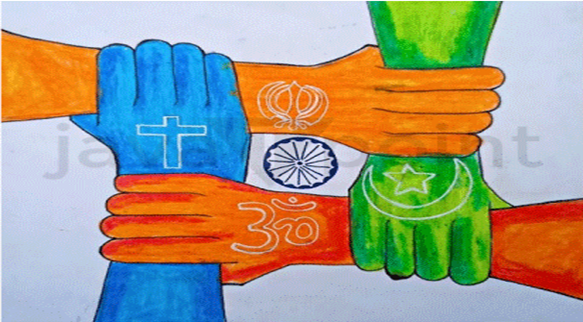FUNDAMENTAL DUTIES
FUNDAMENTAL DUTIES
WRITTEN BY – ANURADHA BEHERA
BALLB, 3rd YEAR
IMS LAW COLLEGE, NOIDA
EDITED BY: ADVOCATE YASH JAIN
AMITY LAW SCHOOL, NOIDA
INTRODUCTION
”The
Constitution of India is an official document which contains Fundamental Rights
such as Right to Equality, Right to Freedom, Right against Exploitation, Right
to Freedom of Religion, Cultural and Educational Rights and Right to
Constitutional Remedies that ensure the protection of citizens against any kind
of injustice and discrimination on the grounds of race, sex, caste, religion,
place of birth etc. It aims at protecting the people's interests,
promoting peace and welfare of the society by adhering to the “Principle of
Natural Justice”. The rights and duties are correlative and inseparable.”
“RIGHTS COME WITH CORRESPONDING DUTIES”
“It
was around 1976, during the emergency, Fundamental Duties were added in the
Constitution. The Fundamental Duties were incorporated in Part IV, Article 51-A
of the Constitution by the 42nd Constitutional Amendment Act, also known
as “Mini Constitution”. The Constitutional Amendment was done on the
recommendation of Swarn Singh Committee. According to Indira Gandhi, then Prime
Minister, “The moral value of Fundamental Duties would be not to smoother
rights but to establish a democratic balance by making the people conscious of
their duties equally as they are conscious of their rights.””
SOURCE
“The
idea of Fundamental Duties is inspired from the Constitution of Russia
(erstwhile Soviet Union). The Fundamental Duties in the Indian Constitution
were originally ten in number which were mentioned in Part IV, Article 51-A,
from a to j, one more duty was added i.e (k) – Duty of all parents/guardians to
send their children in the age group of 6-14 years to school through the 86th
Amendment Act, 2002. All the eleven duties are listed in Article 51-A of the
Constitution (the sole Article in Part IV-A). In 1976, a committee was formed,
known as Sardar Swarn Singh Committee which was recommended by the Congress
Party for the introduction of Fundamental Duties. On the suggestion by the
committee, a separate chapter was included for the duties hence, Part IV was
inserted into
the
Constitution.”
“According to Part IV,
Article 51-A of the Constitution, it shall be the duty of every citizen of
India:
- a) To
abide by the Constitution and respect its ideals and institutions, the National
Flag and the National Anthem;
- b) To
cherish and follow the noble ideals that inspired the national struggle for
freedom;
- c) To
uphold and protect the sovereignty, unity and integrity of India;
- d) To
defend the country and render national service when called upon to do so;
- e) To
promote harmony and the spirit of common brotherhood amongst all the people of
India transcending religious, linguistic and regional or sectional diversities
and to renounce practise derogatory to the dignity of women;
- f) To
value and preserve the rich heritage of the country’s composite culture;
- g) To
protect and improve the natural environment including forests, lakes, rivers
and wildlife and to have compassion for living creatures;
- h) To
develop scientific temper, humanism and the spirit of inquiry and reform;
- i) To
safeguard public property and to abjure violence;
- j) To
strive towards excellence in all spheres of individual and collective activity
so that the nation constantly rises to higher levels of endeavour and
achievement; and
- k) To
provide opportunities for education to his child or ward between the age of six
and fourteen years. This duty was added by the 86th Constitutional
Amendment Act, 2002.”
FEATURES OF FUNDAMENTAL DUTY
Unlike Fundamental Rights, Fundamental Duties are non-justiciable rights just like Directive Principles enshrined in Part III of the Constitution from article 36-51. There is no legal sanction for the enforcement of Fundamental Duties by the courts. No legal sanction is there in case of violation, however, Parliament is free to enforce them with the help of suitable legislation.
Fundamental Duties are a combination of Moral Duties and Civil Duties. For instance, noble ideals of freedom struggle is a moral precept and respecting the Constitution, National Flag and National Anthem is a civic duty.
The Fundamental Rights are confined to citizens only and are not available for the foreigners. However, the Fundamental Duties extend to all people, i.e., citizens and foreigners (non-citizens).
The Fundamental Duties essentially focus on the codification of tasks integral to Indian society. It refers to essential values which every citizen must abide to, in order to preserve and respect Indian traditions, mythology, religions and their practices.
- To uplift and advance India’s rich heritage and diverse culture.
- To promote country’s integrity, oneness and strengthen the feeling of common brotherhood.
- To promote “Unity in Diversity”.
SIGNIFICANCE OF FUNDAMENTAL DUTIES
- It serves as a reminder to the citizens, if they have privilege and rights to enjoy their lives, as responsible citizens, they must also be conscious of their duties they owe to their country, society and fellow citizens.
- The Fundamental Duties helps to advance the Sense of Discipline, Commitment towards the country and the other individuals residing around in a society.
- It helps to determine constitutional validity of law as the Fundamental Duties are enforceable by law. Therefore, Parliament can provide for the imposition of appropriate penalty or punishment if in case of failure to fulfil any of them.
- Admonishes against Anti-Social Activities. These duties serve as warning against the Anti-National and Antisocial Activities like terrorism, defamation, threatening national peace and security, burning the National Flag, destroying public property etc.
- The Fundamental Duties are a constant reminder of Democratic Conduct. They serve as a source of inspiration for the citizens and promote a sense of discipline and commitment among them.
CASE LAWS
In the landmark case of – Bijoe Emmanuel Kant Vs State of Kerala, popularly known as “National Anthem Case”. The Supreme Court of India passed a judgement on 11th August 1986 in which it held that, three school students were not guilty of disrespecting the National Anthem just because they refused to sing it. The students were attending and standing in respect whenever the National Anthem was being sung. However, it is the duty of every citizen to practise their duties towards our country to respect our National Flag and National Flag as mentioned in (a) of Fundamental Duties. In furtherance, the Parliament by law, passed and enforced “The Prevention of Insults to National Honour Act (1971). It focuses on preventing disrespect to the Constitution of India, the National Flag and the National Anthem.
M C Mehta Vs
Union of India (1983)
It
was observed that every citizen has a right to enjoy and avail of a Pollution Free
Environment for better living
conditions as well as prosperity in health. Therefore, Parliament, under
Article 51-A(g) talks about the protection and improvement of the natural
environment, which became the basis for the introduction of legal provisions that later came
into existence – “The Wildlife (Protection) Act of 1972 which prohibits trade
in rare and endangered species and “The Forest (Conservation) Act of 1980 which
keeps an eye on indiscriminate deforestation and diversion of forest land for
non-forest purposes.
CONCLUSION
In
summary, Fundamental Duties play a crucial role in shaping responsible
and conscientious citizens who actively participate in the nation’s growth
which upholds the values and principles that form the foundation of a
democratic society. Promoting social cohesion, upholding democracy, preserving
public property and environment, ensuring national integrity and security, and fostering a sense of discipline and order, including moral values and strength
are the key elements of Fundamental Rights which are contribute to the growth of a
developing country like India.
SUGGESTIONS
Below mentioned
are some suggestions to strengthen the existing Rights and make it available to
all.
Promoting Awareness and Education: Promote awareness and education about fundamental rights among citizens through school curricula, public awareness campaigns, and outreach programs.
Stricter Enforcement: Ensure rigorous enforcement of existing fundamental rights through effective legislation and judiciary oversight. Expedite the resolution of cases related to the violation of fundamental rights.
Amendments and Expansions: Periodically review and update the fundamental rights to address evolving societal needs. Consider amendments to the Constitution to expand and clarify existing rights or add new ones if required.
Protection of Digital and Privacy Rights: Strengthen laws and regulations to protect digital rights, privacy, and data protection, in line with evolving technology and online threats.
Anti-Discrimination Measures: Implement and strengthen anti-discrimination laws to address various forms of discrimination, including those based on gender, sexual orientation, disability, and more.
Equal Pay and Workplace Rights: Ensure equal pay for equal work, irrespective of gender or other characteristics. Strengthen workplace rights, such as safe working conditions and protection against harassment.
Access to Justice: Improve access to the justice system, particularly for marginalized communities, by establishing legal aid services and reducing legal costs. Promote alternative dispute resolution mechanisms for faster and more affordable access to justice.
Protecting Minority and Indigenous Rights: Safeguard the rights of minority communities and indigenous groups, including their cultural and land rights. Promote affirmative action and policies to uplift marginalized communities.
Protection of Environmental Rights: Recognize and enforce environmental rights as part of fundamental rights to protect the environment and the right to a healthy and sustainable living environment.
Freedom of Speech and Media: Ensure freedom of speech and expression while addressing concerns related to hate speech, fake news, and misinformation responsibly. Protect and promote a free and independent media as a vital pillar of democracy.
Right to Information: Strengthen the Right to Information (RTI) Act to promote transparency and accountability in government and public institutions.
Access to Healthcare and Education: Recognize the right to healthcare and education as fundamental rights. Ensure affordable and accessible healthcare and quality education for all.
Safeguarding Cybersecurity and National Security: Balance fundamental rights with the need for cybersecurity and national security measures, ensuring that citizens' privacy and civil liberties are respected.
Promote Gender Equality: Enforce gender equality through laws and policies that address issues such as violence against women, workplace discrimination, and gender-based stereotypes.
Public Participation: Encourage public participation in the policymaking process to ensure that fundamental rights are in tune with the aspirations of the people.
Human Rights Commissions: Strengthen and empower national and state human rights commissions to monitor and address human rights violations effectively.
These
suggestions are intended to contribute to the ongoing efforts to improve and
protect fundamental rights in India, and they are entirely free of plagiarism.
The process of enhancing these rights is a dynamic and continuous one that
requires the involvement of government institutions, civil society, and the
active engagement of citizens.
REFERENCES
https://www.legalserviceindia.com/legal/article-132-fundamental-duties.html
https://blog.ipleaders.in/fundamental-duties-2/
https://blog.finology.in/Legal-news/emergency-amendment-constitution
https://unacademy.com/content/railway-exam/study-material/polity/11-fundamental-duties-in-india/






Comments
Post a Comment